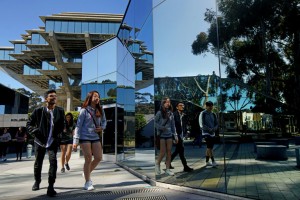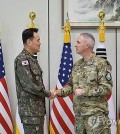- California Assembly OKs highest minimum wage in nation
- S. Korea unveils first graphic cigarette warnings
- US joins with South Korea, Japan in bid to deter North Korea
- LPGA golfer Chun In-gee finally back in action
- S. Korea won’t be top seed in final World Cup qualification round
- US men’s soccer misses 2nd straight Olympics
- US back on track in qualifying with 4-0 win over Guatemala
- High-intensity workout injuries spawn cottage industry
- CDC expands range of Zika mosquitoes into parts of Northeast
- Who knew? ‘The Walking Dead’ is helping families connect
On Campuses Far From China, Still Under Beijing’s Watchful Eye
By STEPHANIE SAUL New York Times
SAN DIEGO — In the competition for marquee commencement speakers, the University of California, San Diego thought it had scored a coup this year — a Nobel Peace Prize winner, best-selling author and spiritual North Star to millions of people.

Students at the University of California, San Diego, where an organization of Chinese students is protesting the invitation of the Dalai Lama as a commencement speaker. Credit Sandy Huffaker for The New York Times
“We are honored to host His Holiness the 14th Dalai Lama,” gushed Pradeep Khosla, the university’s chancellor, “and thankful that he will share messages of global compassion.”
Within hours of Mr. Khosla’s announcement, though, the university was blindsided by nasty remarks on Facebook and other social media sites: “Imagine how Americans would feel if someone invited Bin Laden,” said one.
At the center of the opposition was the U.C. San Diego chapter of the Chinese Students and Scholars Association, which threatened “tough measures to resolutely resist the school’s unreasonable behavior.” The Chinese government accuses the Dalai Lama of promoting Tibetan independence from China, and if the student group’s message sounded a bit like the Beijing party line, that may have been no coincidence: The group said it had consulted with the Chinese Consulate in Los Angeles on the matter.
China’s booming economy has increasingly allowed more of its young men and women to seek a college education in the West; 329,000 now study in the United States, more than five times the number recorded a decade ago. By far the largest contingent of foreign students, they can be an economic lifeline for colleges, since they usually pay full tuition, and they can provide a healthy dose of international diversity.
But those students often bring to campus something else from home: the watchful eyes and occasionally heavy hand of the Chinese government, manifested through its ties to many of the 150-odd chapters of the Chinese Students and Scholars Associations.
The groups have worked in tandem with Beijing to promote a pro-Chinese agenda and tamp down anti-Chinese speech on Western campuses. At Columbia a decade ago, the club mobilized students to protest a presentation about human rights violations in China, urging them to “resolutely defend the honor and dignity of the Motherland.” At Duke, the group was accused of inciting a harassment campaign in 2008 against a Chinese student who tried to mediate between sides in a Tibet protest. More recently in Durham, England, the group acted at the behest of the Chinese government to censor comments at a forum on China-Hong Kong relations.
In rare instances, members of the student group have been accused of spying.
The organization’s influence troubles some China scholars and human rights activists, who say it wields outsize sway over American campuses because of the sizable tuition paid by Chinese students abroad, a group recently exhorted by China’s government to increase their patriotism and devotion to the Communist Party.
“I basically don’t think that any student organizations that are controlled by their government — which clearly the C.S.S.A. is — should have a presence on foreign university campuses,” said Jeffrey Henderson, a professor of international development at the University of Bristol in England.
A Hong Kong expert, Dr. Henderson was invited to speak at a 2014 workshop at Durham University in England organized by the Chinese Students and Scholars and two other groups to discuss the Umbrella Movement — in which protesters had shut down streets in Hong Kong demonstrating against the Chinese government’s failure to hold democratic elections there.
Two days before the workshop, Dr. Henderson said, he received an email on behalf of the president of the Chinese Students and Scholars Association stating that the Chinese Embassy in London was “very concerned that nothing should go on in the workshop that disturbs the harmonious relationship between Hong Kong and China.”
Dr. Henderson arrived with plans to ignore the embassy guidance. Yet he found the seminar’s Q. and A. session tightly controlled, permitting only written questions that had been vetted.
Meetings in Motels
For the most part, the clubs function as run-of-the-mill campus groups, providing transportation for new arrivals, sponsoring Lunar New Year celebrations and organizing bilingual job fairs. Joining the Chinese Students and Scholars Association on some campuses is competitive. Students are required to apply for spots on club committees, and being accepted confers a certain measure of prestige; members often trumpet it on their LinkedIn pages.
Neither the Chinese embassies in Washington and London nor the consulate in Los Angeles responded to questions about their ties to the student organizations.
Leo Yao, departing president of the student association’s chapter at U.C. San Diego, said the group’s only regular interaction with the government was an annual meeting at the consulate, during which student safety and campus events are discussed.
“So it’s true that we have connections with the consulate, but it’s not the kind of relations that many people say we have,” said Mr. Yao, a probability and statistics major from Zhuhai, China. “They think we represent the Chinese government, that we do things the Chinese government tells us to do, things like that, but that’s not true.”
Chinese Students and Scholars Association groups started to spread in the 1980s as the number of Chinese students studying abroad began to grow. “I came to the U.S. and thought, ‘Wow, great, I’m in a free country, now I hope that everything is cool and happy,’” said Frank Tian Xie, who arrived in the late 1980s to study chemistry at Purdue University. “But I found out that the government extended their control to even Chinese students in America.”
Dr. Xie, now a professor at the University of South Carolina, Aiken, said the Chinese Consulate in Chicago tried to handpick officers of the organization and periodically sent a representative to meet with students in a motel room.
Li Fengzhi, a longtime employee of the Chinese Ministry of State Security who came to the United States in 2003 as a graduate student at the University of Denver, said that the Chinese government did not see the group so much as a spying operation, but rather as a propaganda and “information collection organization.” Mr. Li eventually defected and was debriefed by F.B.I. counterintelligence agents about the group’s activities.
The ties between the Chinese government and the student groups are not exactly secret. At some colleges, like the University of Connecticut and the University of North Texas, the groups’ websites mention that they are supported by or affiliated with Chinese consulates.
Michigan Technological University’s group acknowledges a relationship with the Chinese Embassy, then adds, “However, C.S.S.A. will not participate in any political revolutions, unless in special conditions.”
But their relationship can also be covert. In the 1990s, Canadian immigration officials accused a leader of the group’s chapter at Concordia University in Montreal of using funds from the Chinese government and supplying Chinese diplomats with information regarding pro-democracy Chinese students.
In 2005, authorities in Belgium said they had identified another Chinese spy — a member of the Chinese Students and Scholars Association at Leuven University — coordinating industrial espionage agents throughout Europe, according to an unclassified 2011 F.B.I. report.
Perry Link, a China expert and co-editor of the English version of “The Tiananmen Papers,” a compilation of secret Chinese documents relating to the Tiananmen Square protests, characterized the student organization as “a tool of the government’s foreign ministry” that, among other activities, keeps tabs on unpatriotic speech among Chinese students.
“The effect of that surveillance is less that certain people are caught and punished and more that virtually all Chinese students know they could be reported and, therefore, watch what they say in public fora,” said Dr. Link, now a professor at the University of California, Riverside.
Off-Limits Topics
At Columbia in 2007, a Canadian human rights lawyer, David Matas, arrived to find heavy security and a protest by the Chinese Students and Scholars Association against his presentation on China’s mistreatment of adherents of Falun Gong, a spiritual practice that combines portions of Buddhism, meditation and exercise and is banned by the government.
Later, a threatening email — apparently directed at Mr. Matas — was sent to the Columbia group’s website, stating, “Anyone who offends China will be executed no matter how far away they are,” Mr. Matas said recently.
Last month the Columbia chapter held its annual China Prospects Conference at the Low Memorial Library at Columbia, focusing on economic policy and sustainable development. Several dozen government, academic and business leaders spoke to an audience of mostly Chinese students, and the agenda avoided third-rail topics such as human rights, Taiwan and the Dalai Lama.
A conference program said it had “full support from the Embassy of the People’s Republic of China.”
Several colleges where the Chinese Students and Scholars Association openly acknowledges ties to the Chinese government, including Columbia, said such ties did not violate any college rules. But colleges have found themselves caught up in Chinese politics just the same.
After the University of Calgary conferred an honorary degree on the Dalai Lama in 2009, the Chinese government withdrew Calgary from its list of accredited international universities for a year. Enrollment from China dipped slightly, then grew again after accreditation was restored and is now a quarter of the university’s total international students.
At U.C. San Diego, about 3,500 undergraduates hail from China, or more than 10 percent of the student body. They pay more than twice what California students pay, providing critical revenue at a time when the University of California system is financially pressured.
Last year, Mr. Khosla, the chancellor, laid the groundwork for the Dalai Lama’s speech, meeting with him in Dharamsala, India, where the Dalai Lama has lived since fleeing Tibet after a 1959 uprising. Through his office, Mr. Khosla declined to be interviewed.
Other than Mr. Yao, the exiting club president, members of the group declined requests for interviews. But some other Chinese students said they also were offended by the Dalai Lama’s invitation. At the Price Center, a campus student center and food court, several who were eating lunch one recent afternoon predicted protests on June 17, commencement day. One said his parents were going to miss his graduation because they refused to be present for the Dalai Lama’s speech.
Shiwei Terry Zhou, a junior from Wuhan, China, said the students felt targeted by the university’s decision. “We make good grades. We don’t make trouble. We pay a lot,” Mr. Zhou said. “What is the motivation?”
Despite the pressure, the university has not backed down. At a meeting with Mr. Khosla, members of the Chinese Students and Scholars Association asked that the university at least refrain from referring to the Dalai Lama as a “spiritual leader” and that he be prevented from discussing politics.
“Rebranding is very important so we won’t take this personally, maybe,” Mr. Yao said.
The university has not said if it will comply with those demands. In a statement, it said it has always “served as a forum for discussion and interaction on important public policy issues and respects the rights of individuals to agree or disagree as we consider issues of our complex world.”















